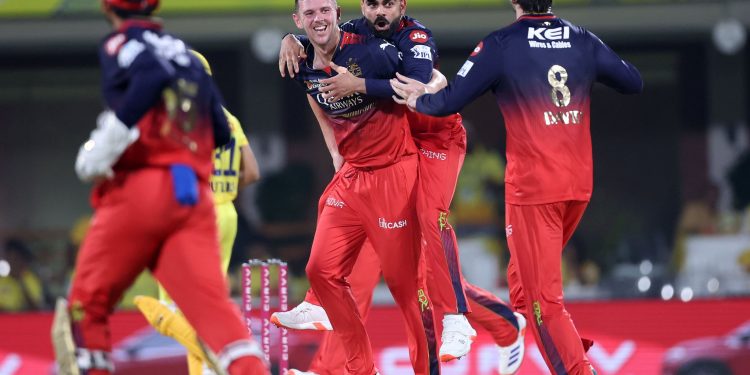At Chepauk, it was a day of the ridiculous.
Virat Kohli timed roughly five of the thirty balls he batted. Following Ravichandran Ashwin, whose departure was strangely applauded by both sets of fans, MS Dhoni stepped out to bat at No. 9. And after 6,155 days, CSK lost to RCB at home. Possibly the most peculiar of all was a brief press conference with the typically composed Stephen Fleming following the game. The head coach of the Chennai Super Kings gave himself a moment of candour in a quick and acerbic conversation, acknowledging that he and his team had not been able to read pitches at home for a few years.
How would RCB respond to the spin trio from CSK? For good reason, that question dominated the game’s buildup. CSK’s spinners had combined for 5 for 70 from 11 overs in the season opener played here. RCB appeared susceptible because it was historically designed for truer surfaces. However, the contest changed one pitch to the right on Friday, and the entire script was reversed. The true query was whether CSK could manage the seamers from RCB. They were unable to. Josh Hazlewood and Bhuvneshwar Kumar set the tone for CSK’s greatest home loss (by runs) with their combined 4 for 41 from 7 overs.
Hazlewood is easily classified as a red-ball specialist. His bowling is based on accuracy; he hits the channel, extracts movement from the surface, and lands it on the back of a length from a high release point. He is also a crucial asset in at least two stages of the contemporary T20 game because of all those qualities. It’s interesting to note that his T20 reinvention gained momentum in 2020–21 while he was playing for CSK. He joined the RCB in 2022 and claimed 20 wickets in 12 games, including seven during the PowerPlay, when he allowed just 6.54 runs per over.
He missed the most of the previous two seasons due to injury setbacks, but RCB never lost faith in him. It said volumes about his worth that they were prepared to pay INR 12.5 crore to bring back a bowler with a concerning previous injury record. Additionally, RCB spent INR 10.75 crore to get Bhuvneshwar, and the expenditures were well justified. They were attempting to solve a major issue from the previous season in addition to bolstering their bowling ranks with much-needed expertise.
Bhuvneshwar is the best PowerPlay bowler in IPL history based on statistics. He has taken the most wickets (73), and in his 14-year career, he has delivered an incredible 56% dot balls at an economy rate of just 6.39. Even while RCB excelled on many different categories last season, their PowerPlay bowling continued to be a clear flaw. Their fast bowlers had the lowest bowling average (45.46), got the fewest wickets (15), and their economy (9.34) in the phase was only held above the bottom by Gujarat Titans (9.42).
A healthy Bhuvneshwar and a rejuvenated Hazlewood proved to be formidable on the day, thanks to conditions that provided a combination of swing, seam, substantial bounce, and double-paced variety. The pursuit of 196 by CSK was put down before it could even get airborne. The key? flawless control of length. The batters had no chance to advance and drive because not a single delivery was hurled farther than six meters. Hazlewood, in particular, took full use of the bounce by hitting the pitch in the 8–10 m mark several times.
Hazlewood scored twice in a first over that brought back memories of his time here under the lights during the World Cup opener against India, which also momentarily quieted a boisterous home crowd. Rahul Tripathi spooned a straightforward catch to mid-wicket after being late on an attempted pull for the second consecutive game. Ruturaj Gaikwad, the captain, did not fare much better, but his mistimed pull was easily captured inside the ropes because of the larger leg-side boundary.
After playing with Deepak Hooda for a while, Bhuvneshwar nicked him off with a long delivery on the off-stump channel. The game was over at 26 for 3 inside the PowerPlay. Teams have only chased 180+ after falling behind three runs for less than 30 twice in IPL history: LSG at Chinnaswamy in 2023 and Delhi Capitals against LSG a few days ago. However, RCB could also call out a third seamer in Yash Dayal, who quickly added two wickets in an over to end the game, while CSK had just Khaleel Ahmed to fully utilise a surface they had misread.
In a match that has historically unfolded in an all too predictable way, it was a surprising role reversal. The RCB was ready, and they had the ideal enforcers in Hazlewood and Bhuvneshwar to carry out their objectives. Precision swing and seam bowling changed the course of the match at a place where spin was predicted to rule, shifting the focus from RCB’s weaknesses to CSK’s own waning hold on their stronghold.







